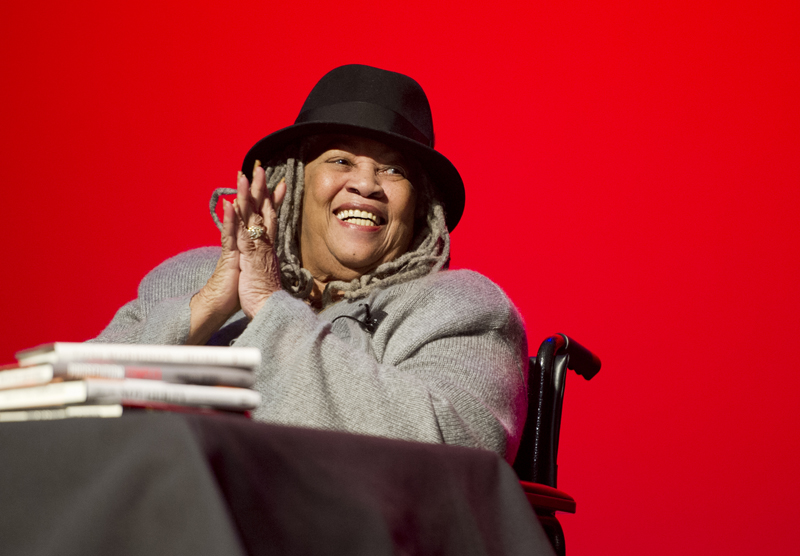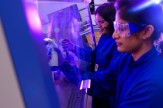Toni Morrison: ‘goodness’ more powerful than violence, hate

World-renowned novelist Toni Morrison said that brutal violence against African-Americans was so commonplace throughout much of the 20th century that it was almost casual how it came to shape their lives in that era.
“Each is a story of humiliation, of degradation, and—very often—of blood,” said Morrison, a Nobel and Pulitzer Prize-winning author. “To revive these stories, to put them on display, is almost as important as the original justice could have been.”
Morrison was the keynote speaker Friday afternoon in Blackman Auditorium at “No Welcome Home: Remembering Harms and Restoring Justice,” an event honoring the legacy of Dr. Martin Luther King Jr. The event was hosted by the Northeastern University School of Law’s Civil Rights and Restorative Justice Project in collaboration with the Northeastern University Humanities Center.
Morrison, 81, focused largely on the idea of goodness, which she described as a quiet force more powerful than violence or hatred. Afterward, she read from her book “Home” and answered questions from an audience of more than 900.
When asked why violence is so pervasive in today’s society, Morrison explained that violence is a spectacle that draws attention, whereas acts of goodness are too often overlooked.
“Evil and violence take the stage—all of it. It needs so much to call our attention,” Morrison said. “But goodness doesn’t need anything. If it says anything at all, it’s a whisper.”
Following two World Wars, the idea of goodness nearly vanished from literature and culture, Morrison explained; today, she said, it hangs on mostly as a topic approached with a great deal of irony.
“Now we have a culture of spectacle,” Morrison lamented, “and the idea of goodness—real goodness, from the people who don’t put their names on it—seems to have been completely erased.”

President Joseph E. Aoun (right) speaks to author Toni Morrison on Friday’s event in Blackman Auditorium, Photo by David Leifer.
Near the end of the evening, Northeastern President Joseph E. Aoun posed a final question to Morrison. “You have been involved in academia for so long, talking all over the world,” he told Morrison, who has served on the faculty at Princeton University. “What are we doing wrong?”
Morrison replied, “I think the academy is scared—of open access to information, of the Internet. Institutions of higher learning are some of the only truly free places we have left, and they have to stay that way.”
The event also highlighted the work of Northeastern’s Civil Rights and Restorative Justice Project, which pursues “perpetrators of unspeakable violence, reviving cases long thought to have gone cold and providing solace for families who had long ago given up hope for justice,” said Jeremy Paul, dean of the School of Law.
The project’s success could not be possible without the tireless investigative work of CRRJ law students, who scour public archives, dig through court records, and interview surviving relatives and witnesses to bring justice to longstanding wrongs.
“It is important that we ask communities what they want and what they need, and then we as a nation must find collective and creative ways to get it done,” said Kaylie Simon, a School of Law alumna who worked on the restorative justice project as a student and is now a deputy prosecutor in Contra Costa, Calif. “It is not just a shooting or a murder that affects a community, but also the response to it.”
“As we move on into the 21st century, leaving further behind the civil rights era, it serves us well to look back at what was accomplished—and what we have left unfinished,” added Northeastern law professor Margaret Burnham, CRRJ’s founder and the first African-American woman to serve on the Massachusetts judiciary.
Earlier on Friday, Morrison participated in a roundtable discussion with a small group of Northeastern students who had recently read her first novel, “The Bluest Eye.” The roundtable was led by Kimberly Brown, an assistant professor of English, and hosted by the Northeastern Humanities Center, a research center in the College of Social Sciences and Humanities, which is led by interim dean Uta Poiger.
“Little black girls were never taken seriously in books, they were always jokes,” Morrison said. “But I wanted to read a book where they were taken seriously, so I had to write it.”
Reflecting on Martin Luther King Jr.’s legacy of nonviolence, Morrison suggested that the Civil Rights era was about much more than the simple hope for a brighter future.
“Martin Luther King didn’t have any guns, he didn’t blow up anything, he didn’t lynch anybody,” Morrison said. “He trained boys and girls to just sit there and accept insults. That is a thing that is bigger than hope. It is survival and it is resistance and it is triumph.”
Northeastern’s celebration of King’s life and legacy continued on Monday with the annual King Day of Service and Leadership, which drew several hundred Northeastern students and community members to campus to work on service projects that benefit local communities.
Northeastern will hold its annual Dr. Martin Luther King, Jr. Convocation on Thursday at 12 p.m. in Blackman Auditorium. This year’s keynote speaker is Setti Warren, the mayor of Newton, Mass., who will reflect on King’s leadership and its meaning in today’s world.





